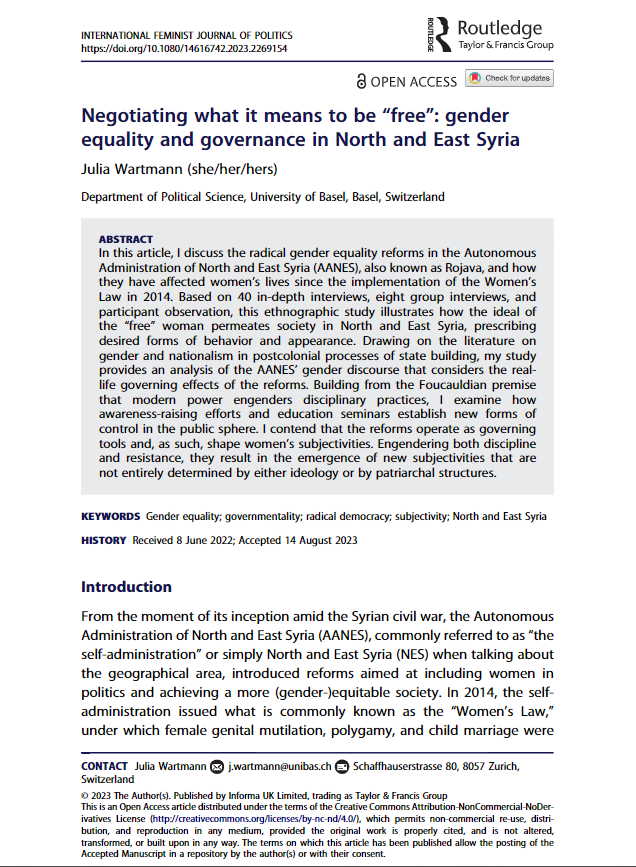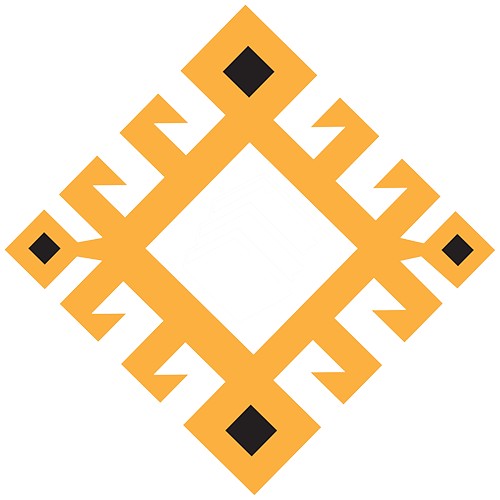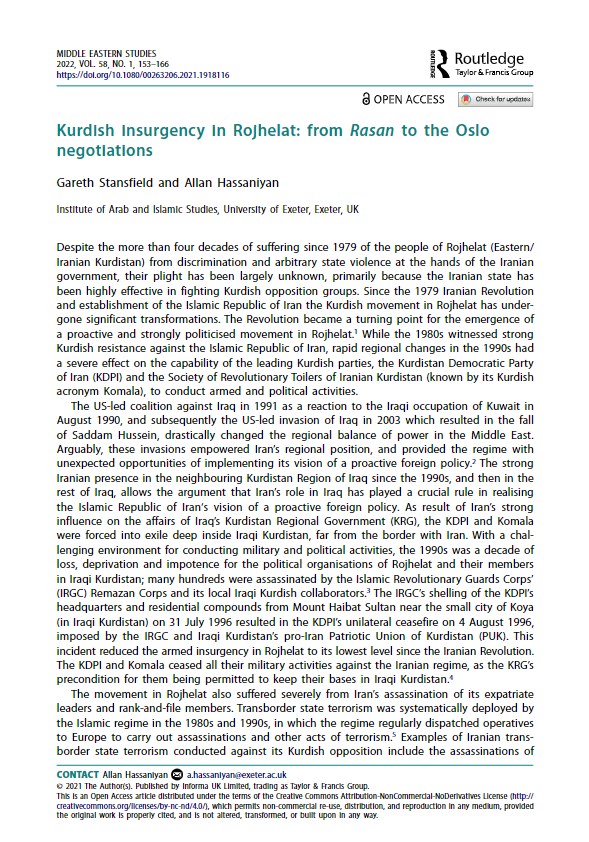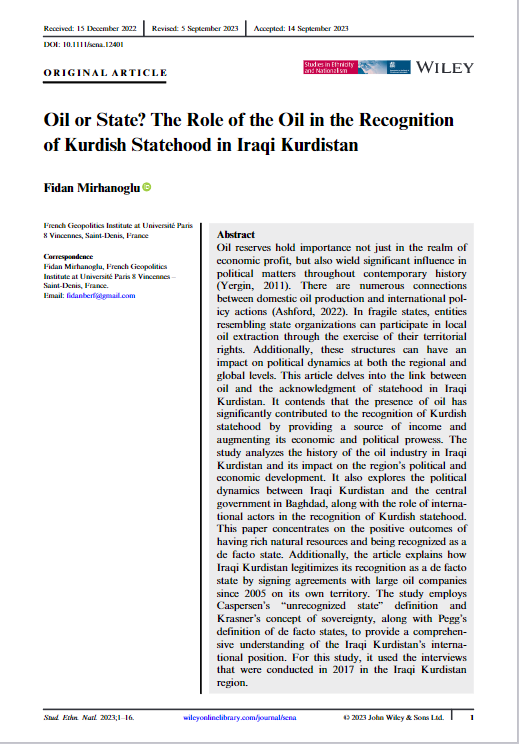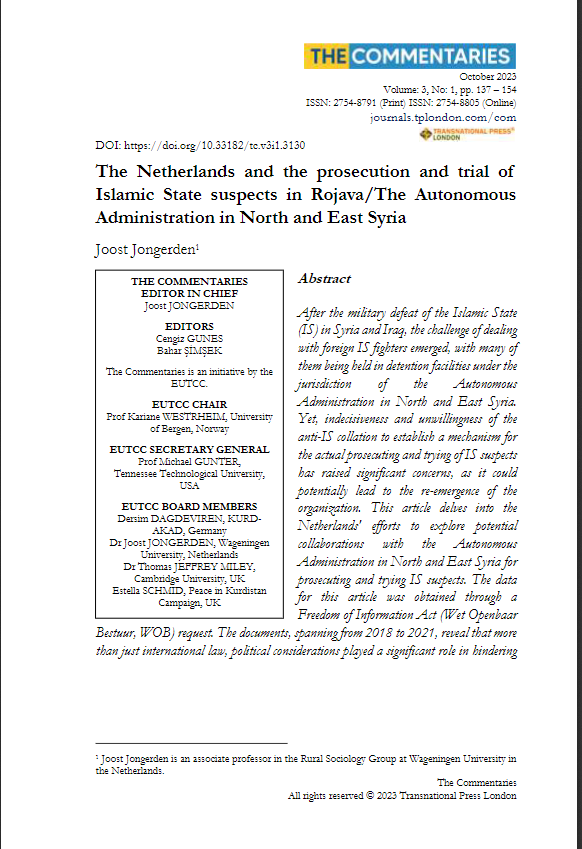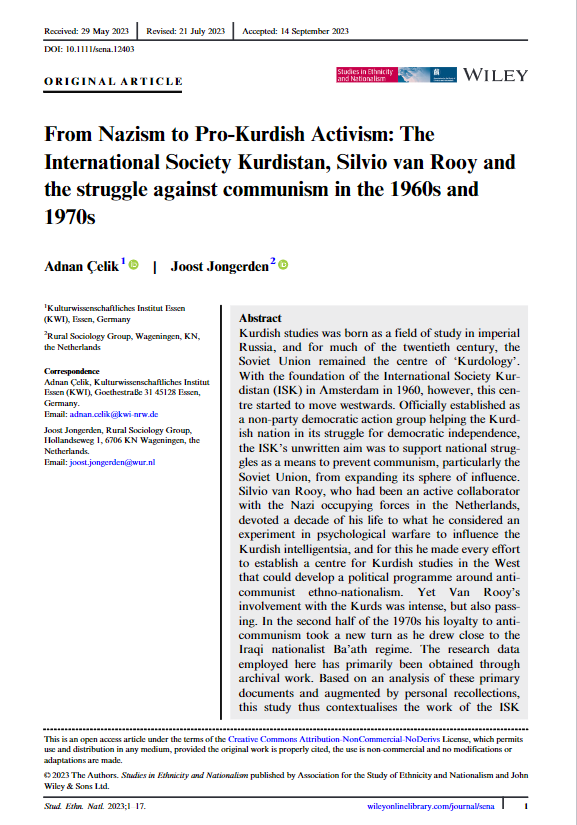1 N. Entessar, ‘The Kurds in Post-Revolutionary Iran and Iraq’, Third World Quarterly Vol. 6, 4 (1984), pp.911-33.
2 Nikolay Kozhanov, Iran’s Strategic Thinking: The Evolution of Iran’s Foreign Policy (Berlin: Gerlach Press, 2018) p.1.
3 A. Hassaniyan, ‘Crossborder Kurdish Solidarity: An Endangered Aspect of Kurdishness’, Kurdish Studies 7 (2019), pp.135–60.
4 M. Gunter, ‘Turkey and Iran Face off in Kurdistan’, Middle East Quarterly 5 (1998), pp.33–40.
5 Kerim Yildiz and Tanyel Taysi, The Kurds in Iran The Past, Present and Future (London: Pluto Press, 2007), pp. 27–30.
6 Carol Prunhuber, The Passion and Death of Rahman the Kurd: Dreaming Kurdistan (New York: iUniverse, 2012).
7 B. Champion and L. Crowther, ‘Alleged Iran-sponsored Attempts to Kill Iranian Expatriates, 1979–2012’, All Faculty Publications, 1570 (2013), pp.49–51.
8 M. Wilford, ‘The Assassins’ Trail: Unraveling the Mykonos Killings’, World Affairs Vol. 174, 4 (2011), pp.81-85.
9 A. Hassaniyan, ‘Environmentalism in Iranian Kurdistan: Causes and Conditions for Its Securitisation’, Conflict, Security & Development 20 (2020), pp.355–78.
10 Nader Entessar, ‘Between a Rock and a Hard Place: The Kurdish Dilemma in Iran’, in David Romano and Mehmet Gurses (eds), Conflict, Democratization, and the Kurds in the Middle East Turkey, Iran, Iraq, and Syria (New York: Palgrave Macmillan, 2014), pp.211–24.
11 B. Sinkaya, ‘The Kurdish Question in Iran and Its Effects on Iran-Turkey Relations’, British Journal of Middle Eastern Studies, 45 (2018), p.846; S. Akbarzadeh, Z.S. Ahmed, C. Laoutides and W. Gourlay, ‘The Kurds in Iran: Balancing National and Ethnic Identity in a Securitised Environment’, Third World Quarterly 49 (2019), pp.1145–162.
12 K. Soleimani and A. Mohammadpour, ‘The Securitisation of Life: Eastern Kurdistan under the Rule of a Perso-Shi’i State’, Third World Quarterly 41 (2020), pp.663–82; K. Soleimani and A. Mohammadpour. ‘Life and Labor on the Internal Colonial Edge: Political Economy of Kolberi in Rojhelat’, British Journal of Sociology 71 (2020), pp.741–60.
13 A. Hassaniyan, ‘The Gains and Risks of Kurdish Civic Activism in Iran’, Middle East Report Online 295 (2020).
14 Hengaw, ‘Jegir kerdni Hadshi Sha’bi le shari Shno, Saqhez u Bokan’ [Stationing militiamen of Hashd al-Shaabi near Shno, Saqhez and Bokan], 24 May 2019, https://bit.ly/2k9Gmpx.
15 F. Hawramy, ‘Kurdish Parties Seek US Support for Operations in Iran’, Al-Monitor, 20 June 2018, https://bit.ly/2kdEQm9.
16 M. Hugh, ‘Conflict Transformation: A Multi-Dimensional Task’, Berghof Research Center for Constructive Conflict Management (2004), pp.1–20.
17 Rasan is the term the KDPI has chosen for its new phase of activity, meaning a revival or sudden rising, referring to the KDPI’s decision to restart its insurgency. One of the main subjects of the KDPI’s 15th Congress (September–October 2012) was re-organising the armed insurgency as part of the Kurdish challenge to Tehran. Consequently, in spring 2015 the KDPI stationed some of its Peshmerga units in Iraqi Kurdistan’s border areas near Rojhelat. Nevertheless, it is also important to point out that Rasan-i Rojhelat is a KDPI initiative; in the fragmented cross-organisational environment in Rojhelat, the other political parties are not, at least to appearances, necessarily very concerned with it as such.
18 Sinkaya, ‘The Kurdish question’, p.847.
19 Cengiz Gunes, The Kurds in a New Middle East: The Changing Geopolitics of a Regional Conflict (London: Palgrave Macmillan, 2019), pp.87–88.
20 Author’s interview with Aso Saleh, Stockholm, 15 September 2019.
21 Kurdistanmedia, ‘Hezb-e Demokrat hich gah az rabetayi esteqbal nemikoned ke rewand-e demokrasikhahi der Iran ve menteqe ra dochar-e moshkel koned’ [The KDPI will never be involved in a relationship which undermines the process of democratisation in Iran and the region], 28 July 2016, https://bit.ly/2PwhGpQ.
23 I. Sharifi, Rasan u Rehende Teoriyekani; Rojhelat [Understanding Rasan through theoretical approaches] (Koye: Tishk Magazine and KDPI Strategic Centre, 2020).
25 BBC Persian, ‘HDKA; ba Jumhori-e Islami vared-e jang shodeim’[KDPI; we have entered into war with the Islamic Republic].
26 Kurdistanmedia, ‘Murat Karayılan, Mobareze-y moselehan-e ba Jumhori-e Islami-e Iran ra khedmet be Arebestan ve Torkiye midaned’ [Murat Karayılan argues armed insurgency is serving the interests of Turkey and Saudi Arabia], 17 August 2016, https://bit.ly/2Kxpt56.
27 Other armed forces, known as the Eagles of Kurdistan and the Protection Units of Rojhelat, have taken responsibility for these operations. The KDPI and KDP-I claim that these forces belong to their clandestine armed cells, acting semi-independently, relying on their resources inside Rojhelat.
28 Hengaw, ‘Sher le Kordestan, Raporti Amari Hengaw, le sher u tekhelchoni chekdari sali 2018’ [Recorded armed clashes between Kurdish forces and governmental armed forces in 2018], 2 January 2019, https://bit.ly/2jVv7Rj.
29 Shortly after this attack, the KDP-I issued the following statement (reproduced here verbatim): ‘Today Saturday September 8 at 10:45 local time Islamic Regime in Iran attacked the headquarter of Kurdistan Democratic Party (KDPIran). The air and missile attack targeted the meeting (Plenum) of the central committee/leading board of Kurdistan Democratic Party. It needs to be pointed out that the headquarter of KDP-Iran is located near to Koya city in the Iraqi Kurdistan long inside Iraq and far from [the] Iran-Iraq border. This headquarter had been targeted once before on December 21, 2016 when 7 members of the party were killed during a terrorist attack planned and carried out by the Iranian regime agents. During and after the attack, the Iranian military drones were seen flying over Koya and the region. This attack was carried out shortly after Iran’s execution of three Kurdish prisoners, Zaniar and Loqman Moradi, and Ramin Hossein Panahi.’ KDP Press, ‘Iranian regime’s missile attack On September 8th, 2018’, 8 September 2018, p.4, http://kdppress.org/wp-content/uploads/2018/11/KDP-8th-Septembre-Report.pdf.
30 A. Hassan Zadeh, ‘Mozakerey ahzab-e siyasi-e Kord ba Jumhori-e Islami, chera ari? chra ne?’ [Kurdish Political Parties and Negotiations With the Islamic Republic: Why Yes? Why No?], Deutsche Welle, 17 August 2019, https://bit.ly/2PltM56.
32 O. Bengio, ‘The Kurds in a Volatile Middle East’, Mideast Security and Policy Studies no. 130 (2017), p.36.
33 O. Ilkhanizadeh, ‘Wtowej le gal dengi Amrika’ [Interview With VOA], VOA, 21 September 2018.
35 Ilkhanizadeh, ‘Wtowej le gal dengi Amerika’.
36 Hassaniyan, ‘Crossborder Kurdish Solidarity’, p.152.
38 H. Gowhary, PKK: le Abdullah Ocalanewe bo Jamil Bayek [PKK: From Abdullah Ocalan to Jamil Bayek], (Erbil: Hawler Publications, 2016), pp.77–83.
39 Author’s interview with Siamand Moeini, Stockholm, 15 September 2019.
40 Gareth Stansfield, ‘Kurds, Persian Nationalism, and Shi’i Rule: Surviving Dominant Nationhood in Iran’, in David Romano and Mehmet Gurses (eds), Conflict, Democratization, and the Kurds in the Middle East Turkey, Iran, Iraq, and Syria (New York: Palgrave Macmillan, 2014), pp.77–78.
41 Sinkaya, ‘The Kurdish Question’, p.846.
42 According to Moeini, ‘after the intensification of the clashes between the PJAK and Iranian forces, and the IRGC’s massive attack on PJAK bases in Qandil, we were recommended by the KNK [Kurdistan National Congress], PUK and KRG authorities, to agree a ceasefire with the Iranians’. He also mentions that ‘due to financial difficulties and the high cost of armaments, the PJAK was not able to maintain the war against Tehran’. In response to the question of what was gained from this ceasefire, Moeini replied ‘Nothing. It is one of those sad realities we have to deal with in our struggle.’ Author’s interview with Moeini. Nevertheless, Michael Gunter writes the following on the 2011 ceasefire: ‘After relatively large-scale clashes between the PJAK and Iran in the summer of 2011, the two sides announced a cease-fire, and, in October 2011, KRG president Massoud Barzani declared that the PJAK would terminate its armed actions. However, low-level fighting continues, and Iran has hanged several captured PJAK members. Nevertheless, the PJAK has largely maintained the cease-fire, while declaring that it was going to send militants to join the PKK in the Kurds’ Syrian struggle. Given the divisions that prevailed until at least recently within the KDPI and the decline of Komala, opportunity spaces for PJAK have clearly opened up and been utilized.’ In M. M. Gunter, ‘Iran’s Forgotten Kurds’, Journal of South Asian and Middle Eastern Studies 43 (2020), p.65. Nevertheless, Sinkaya asserts that the PKK uses the PJAK as a bargaining chip in its relationship with Tehran, and claims ‘accordingly, the ceasefire between PJAK and Iran in 2011 encouraged Tehran to utilize the PKK as leverage against Turkey because of diverging interests and contrasting regional policies of the two countries’. Sinkaya, ‘The Kurdish question’, p.855.
43 S. Palani, ‘PJAK hezeki henardekraw bo serzemineki kheyali’ [The PJAK: An exported force from the illusionary lands of the PKK to Rojhelat], Brwska, 2 September 2018, http://brwska.org/content-98.html. S. Palani, ‘PJAK hezeki henardekraw bo amanjeki taybeti’ [The PJAK: An exported force for a specific interest], Brwska, 2 September 2018, http://brwska.org/content-108.html.
44 Sinkaya, ‘The Kurdish question’, p.854.
46 Walter Posch, ‘Iranian Kurds: Fellow Aryans and Muslim Brothers’, in Mohammed Shareef and Gareth Stansfield (eds), The Kurdish Question Revisited (London: Hurst, 2017), pp.345–50.
47 I. Ahmedi, ‘The Stateless and Why Some Gain and Others not: The Case of Iranian Kurdistan’, in E. E. Tugdar and S. Al (eds), Comparative Kurdish Politics in the Middle East Actors, Ideas, and Interests (New York: Palgrave Macmillan, 2018), p.215.
48 Author’s interview with Moeini.
49 Nader Entessar, Kurdish Politics in the Middle East (Maryland: Lexington Books, 2009), pp.38–39.
50 A. Hassaniyan, ‘Non-Violent Resistance in Iranian Kurdistan After 1979’, Journal of Ethnic and Cultural Studies 6 (2019), pp.98–110.
51 Yildiz and Taysi, ‘The Kurds in Iran’, p.28.
52 Radiozamaneh, ‘Mozaker-e der Oslo, miyan-e chehar hezb-e Kordestan-e Iran ba nemayendegan-e Jumhori-e Islami’ [Negotiations in Oslo between four Iranian Kurdistan parties and representatives of the Islamic Republic], 7 July 2019. https://www.radiozamaneh.com/453931.
53 ‘Zemin-e sazi beray mozakere’ [Preparations for negotiations], Deutsche Welle, 8 July 2019, https://bit.ly/3hgPLoa.
54 ‘Mozakery-e ba’zi az ahzab-e mohem-e Kord ba nemayendegan-e Jumhori-e Islami’ [Negotiations of several mainstream Kurdish political parties with representatives of the Iranian government], BBC Persian, 19 July 2019, http://www.bbc.com/persian/iran-48925285.
55 Komala, ‘Rageyandeni Nawendi Hawkari Hezbekani Kordestan sebaret be dengoy wtowej legal Komari Islami’ [Statement of the cooperation centre of Iranian Kurdistan’s political parties on the negotiations with the Islamic Republic], 13 July 2019. http://www.komala.com/7491.
56 Author’s interview with Saleh.
57 Author’s interview with Moeini.
59 Radiozamaneh, ‘Mozaker-e der Oslo’.
60 Komala, ‘Kordestan-i Iran le beyni sher u danostan’ [Iranian Kurdistan Between War and Negotiations], 20 July 2019. http://www.komala.com/7498.
61 Hassan Zadeh, ‘Mozakerey ahzab siyasi-e Kord’.
62 N. Debagh, ‘Pewest-e Heremi Kordestan helwesti le beranber heze Kordeyekani Iraneweu hebet’ [The KRG should Not Tolerate the Activities of Iranian Kurdish Political Parties], Kurdpa, 23 July 2019. http://www.kurdpa.net/sorani/dreje/73763.
64 Author’s interview with anonymous high-ranking KDPI official, Frankfurt, Germany, 15 August 2019.
65 See S. Alavi, ‘Mozaker-e ahzab-e Kord ve Jumhori-e Islami’ [Negotiations Between Kurdish Parties and the Islamic Republic], Iranwire, 13 July 2019. https://iranwire.com/fa/features/32036.
66 Iran International, ‘Tigh-e dolebey-e mozakerey ahzab-e Kord ve Jumhori-e Islami’ [The Double-Edged Negotiation], 12 July 2019. https://bit.ly/2kpFA84.
67 The meeting in Stockholm included representatives of the major political parties of Rojhelat. Aso Saleh, reading the official policy of the KDPI toward the Congress, stated the Rasan has also welcomed cooperation and the establishment of trust between different organisations of Rojhelat, though significant unpredictability and challenges face the movement in this part of Kurdistan. The authors of this article were, through participation in this event, able to observe and analyse the Congress.
